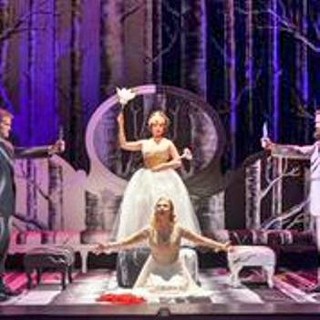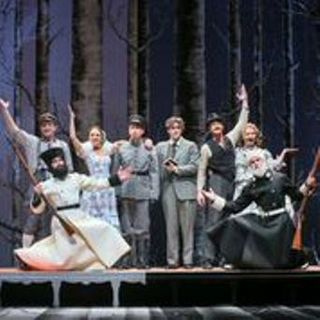|
Back
Martinů’s Magical World New York
Gerald W. Lynch Theater, John Jay College
10/14/2014 - & October 16, 17, 18, 2014
Bohuslav Martinů: Comedy on the Bridge, H. 247 – Alexandre Bis, H. 255 (American Premiere)
Jenna Siladie (Armande/Popelka), Abigail Fischer (Eva), Cassandra Zoé Velasco (Philomène), Jason Slayden (Oskar/Ucitel), Jarrett Ott (Alexandre & Alexandre 2/Sykos), Joseph Beutel (Portrait & Alexandre 1, Bedron), Aaron Sorenson, Christiaan Smith-Kotlarek (Devil-dancers/Guards)
Gotham Chamber Opera Orchestra, Neal Goren (Conductor)
James Marvel (Stage Director), Cameron Anderson (Set designer), Fabio Toblini (Costume Designer), Clifton Taylor (Lighting Designer)

Alexandre: J. Ott, C. Zoé Velasco, J. Beutel, (Sitting) J. Siladie
(© Richard Termine)
After a hiatus of 12 years, the Gotham Opera Company finally returned to Bohuslav Martinů. Their first offering in 2002 had been a pair of chamber operas which nobody had ever heard about. (Martinů was one of the most prolific composers of the last century.) Last night, they found two more chamber operas.
One was that pretty well-known Comedy on the Bridge, the other was totally new–and in typical form Alexander Bis (Alexander Twice) was a mélange of the surrealistic (talking portraits, husband-clones, non-stop seductions) the moral (like Così fan tutte and a half-dozen Shakespeare minor plots) and the musically eccentric.
My main complaint with this partially successful evening was not exactly with the production. Rather, it’s that these light, clever comic operas, dealing with dreams and politics, love and memory, are featherweight compared with Martinů’s greatest opera, Julietta. I have never heard of a production in America, but Gotham Opera Company could well put it on some season, for the music is far superior to anything last night, the story is as deep as Strindberg’s Dream Play, and it is–in my opinion–one of the great operas of the 20th Century.
The two operas last night had their startingly good points. The settings and costumes by Jason Stewart and Michael Kaukl were staggeringly effective. Both operas had the grey-and-white backgrounds of trees trunks without branches or leaves (they looked like poplar trunks.) In Alexandre, this same color inhabited the costumes, the objects (even a bicycle with black-and-white wheels), and the lighting. Which made the truly colorful props–a sharp red duster for the maid, a green hat for the athletic seducer, flaming scarlet devil-dancers for a nightmare scene–all the most penetrating.
In Comedy, the drawing room of Alexandre was straightened out for a bridge–the bridge up which five characters are stranded for lack of entry or exit visas–seemed hung above a river, the river in which the main characters contemplate suicide.
That same bridge was guarded by two opposing sentries dressed like Ruritanian guards, whose own costumes contrasted nicely with the rural dirndls and peasant hat of the refugees.
Add to this a fine chamber orchestra led by Gotham’s long-time conductor Neal Goren, and a real Martinů beat by pianist Marnie Laird.
And of course Martinů’s music. In fact, I happen to love some of Martinů’s music (he wrote so much that mediocrity was not rare) that I sometimes resent having to follow the surtitles, distracting me from the trumpet calls (Comedy) and faux-waltzes (Alexandre).
In Martinů operas (outside of Julietta), there are few arias. The orchestra is the great foundation music. But I found the voices in the French libretto of Alexandre (by André Wurmser) forthcoming, bright, taking care of the cues, with some terrific singing by the “picture” (Joseph Beutel) and Jenna Siladie as (in the words of Richard Rodgers), “the girl who can’t say no.”
Yet we had a problem here. The music, the voices and the set were so sparkly that nobody needed extra-cute movements. And to say that Alexandre Bis was “stylized” would be a vast understatement. The men were helplessly taught to twist their pelvises, no matter what the music . The wonderful chambermaid, with her constant dusting, was cute to the point of preciousness.
Martinů at his most engaging, had those movements down perfectly. He was not the most inventive of composers, but he caught the era, the plot, the characters, the volition so unerringly that these stylized motions, often equal to a Three Stooges/Loony Tunes cartoon gilded the lily to the point of fool’s gold. They worked to a degree in a nightmare section (the two male dancers in Satan-suits and Satan pitchforks, wearing pink panties, was wonderful), but otherwise, enough was…well, far too much.
Yes, I enjoyed it, because the story was new and original, and the singing seemed to capture the moments. But I was frankly bored at this so unnecessary stop-motion acting.

Comedy: J. Ott, J. Siladie, J. Dennis, J. Beutel, J. Slayden, A. Fischer, (in front) A. Sorenson, C. Smith-Kotlarek
(© Richard Termine)
<
After the intermission, the 35-minute Comedy on the Bridge (libretto by the composer, based on a radio play by Václav Kliment Klicpera) was, yes, funny, in a typically Czech manner (the answer to a riddle is a nonsense answer, the coincidences are simply silly). But, written just before Europe was going to war, when Martinů’s own Czech homeland would be taken by Germany, and he had to take refuge in Paris and then New York, the theme was all too prescient.
Briefly, the five characters enter at different ends of a bridge, held by two enemy sentries. They each have a firman allowing them to enter–but they don’t have any paper to allow them to exit at either end.
Thus two couples, thus a teacher, find themselves in the same no-man’s land that Kurds, and Iraqis and Gazans and Ukranians and refugees from a hundred different nations experience even today.
(I learned from pianist Rudolf Firkusný, Martinů’s great New York friend, that his interest in politics was never-ending.)
The couples have their own couplings and uncouplings of any salon opera, and all ends happily.
Again, this was played with Mickey Mouse precision, the identical pelvis-twisting, the same abnormal movements, the same idiosyncratic eccentricity.
Director James Marvel, I realize, tried to show off Martinů’s invention so nobody could miss the humor. But every comic actor could tell him that, if the lines (and music) are right, the acting can be played straight, and it is even more entertaining, more amusing.
Bohuslav Martinů is played so rarely in New York that any opportunity to see his operas is worthwhile. Yet at this best, he needs no superfluous help. His genius, satire, his homage to different eras at its best is ineffable and indescribable. The music and sets and good singing (the Czech singing seemed, to my inexperienced ear, quite satisfactory) and splendidly Czech story, were sufficient to themselves. Forcing the actors into ungainly cartoon postures could only detract from Martinů’s singular genius.
Harry Rolnick
|